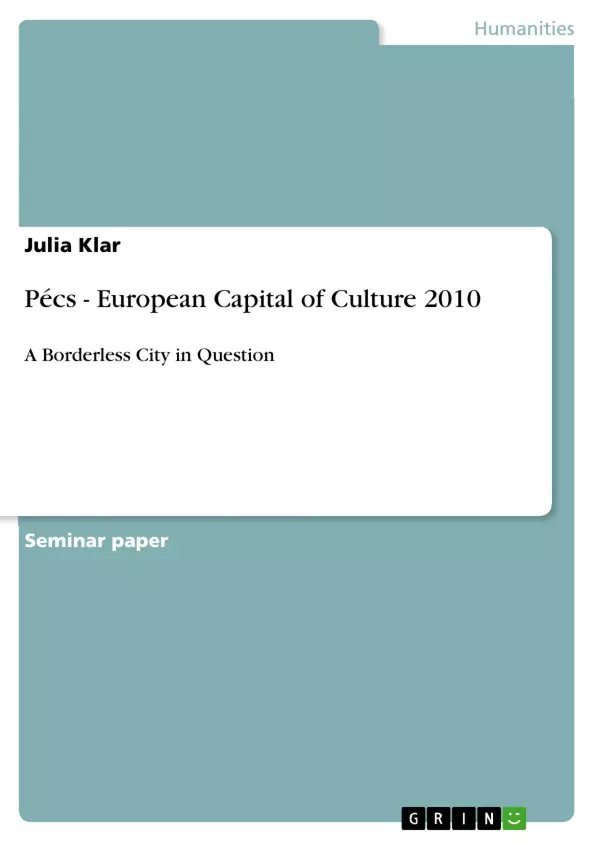Metaphors are crucial for our understanding of the world. Without metaphors we would not be able to understand abstract concepts such as emotions, time and life as such. They do offer a great insight in how our cognitive processes are structured. In addition, it is interesting to see whether completely different languages share the same of different conceptual metaphors. Not only for metaphor understanding but also for the understanding how culture and metaphor are interrelated, the concept of embodiment plays an important role. This present work will show that there exist metaphorical conceptualizations that are almost universal and that we can also find metaphorical aspects that differ across cultures.
Inhaltsverzeichnis (Table of Contents)
- Introduction
- Intercultural Management
- Intercultural Management and European Cultural Policy
- European Capital of Culture: The Program
- Pécs – The „Borderless City”
- Conclusion
Zielsetzung und Themenschwerpunkte (Objectives and Key Themes)
This work examines the concept of intercultural management within the context of the European Union's "European Capital of Culture" program, specifically focusing on the case of Pécs, Hungary, which held the title in 2010. The paper aims to analyze whether Pécs fulfilled its promise of being a "Borderless City" by promoting intercultural dialogue and fostering a diverse and inclusive environment.
- Intercultural Management in the European Union
- The "European Capital of Culture" Program and its Objectives
- Pécs's "Borderless City" Project and its Implementation
- The Role of Minority Groups and Intercultural Dialogue
- Discrepancies Between Official Rhetoric and Reality
Zusammenfassung der Kapitel (Chapter Summaries)
- Introduction: This chapter introduces the "European Capital of Culture" program and its objectives, focusing on Pécs's 2010 title and its "Borderless City" motto. The chapter raises questions regarding the actual implementation of the program in Pécs and the involvement of minorities in the city.
- Intercultural Management: This chapter provides an overview of intercultural management as a relatively new field of study. It highlights the importance of understanding cultural diversity in increasingly globalized work environments and the potential benefits of multicultural teams.
- Intercultural Management and European Cultural Policy: This chapter explores the connection between intercultural management and the European cultural policy. It emphasizes the role of culture in achieving a united Europe and how the concept of intercultural management is linked to economic and financial integration.
- European Capital of Culture: The Program: This chapter delves into the "European Capital of Culture" program itself, explaining the nomination procedure and requirements. It sets the stage for evaluating Pécs's performance as a "European Capital of Culture" by examining its official promotion material and comparing it with experienced reality.
- Pécs – The "Borderless City": This chapter analyzes the promises made by Pécs in its application for the "European Capital of Culture" title, focusing on its "Borderless City" project and its aim to promote intercultural dialogue. The chapter examines the extent to which these promises were fulfilled in practice.
Schlüsselwörter (Keywords)
The key terms and concepts explored in this work include intercultural management, European Union, cultural policy, European Capital of Culture, Pécs, "Borderless City", minorities, ethnic groups, cultural dialogue, and diversity.
Frequently Asked Questions
What was the motto of Pécs as European Capital of Culture 2010?
The motto was "The Borderless City," highlighting the city's multicultural heritage and its aim to foster intercultural dialogue.
What is Intercultural Management?
It is a field of study and practice that focuses on managing diversity and promoting effective communication and collaboration between people from different cultural backgrounds.
How did Pécs involve its minority groups in the program?
The paper critically analyzes this aspect, suggesting a discrepancy between the official "Borderless City" rhetoric and the actual level of inclusion of ethnic minorities like the Roma or Germans.
What are the objectives of the "European Capital of Culture" program?
The program aims to highlight the richness and diversity of European cultures, celebrate shared cultural features, and promote mutual understanding among citizens.
Why are metaphors important for understanding culture?
Metaphors reflect how we structure our thoughts and emotions. Comparing metaphors across languages can reveal universal cognitive processes as well as culture-specific differences.
- Quote paper
- Master of Arts Julia Klar (Author), 2011, Pécs - European Capital of Culture 2010, Munich, GRIN Verlag, https://www.grin.com/document/200168



